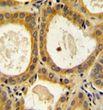CTLA4 (N-term) Rabbit Polyclonal Antibody
Specifications
| Product Data | |
| Applications | IHC, WB |
| Recommended Dilution | Western Blot: 1/2000. Immunohistochemistry on Paraffin Sections: 1/50-1/100. |
| Reactivities | Human |
| Host | Rabbit |
| Isotype | Ig |
| Clonality | Polyclonal |
| Immunogen | KLH conjugated synthetic peptide between 50-78 amino acids from the N-terminal region of Human CD152 / CTLA4. |
| Specificity | This antibody recognizes Human CD152 / CTLA4 (N-term). |
| Formulation | PBS State: Aff - Purified State: Liquid purified Ig fraction Preservative: 0.09% Sodium Azide |
| Concentration | lot specific |
| Purification | Affinity Chromatography on Protein A |
| Conjugation | Unconjugated |
| Storage | Store undiluted at 2-8°C for one month or (in aliquots) at -20°C for longer. |
| Stability | Shelf life: one year from despatch. |
| Gene Name | cytotoxic T-lymphocyte associated protein 4 |
| Database Link | |
| Background | CTLA4 is a member of the immunoglobulin superfamily and encodes a protein which transmits an inhibitory signal to T cells. The protein contains a V domain, a transmembrane domain, and a cytoplasmic tail. Alternate transcriptional splice variants, encoding different isoforms, have been characterized. The membrane-bound isoform functions as a homodimer interconnected by a disulfide bond, while the soluble isoform functions as a monomer. Mutations in this gene have been associated with insulin-dependent diabetes mellitus, Graves disease, Hashimoto thyroiditis, celiac disease, systemic lupus erythematosus, thyroid-associated orbitopathy, and other autoimmune diseases. |
| Synonyms | CTLA-4 |
| Reference Data | |
| Protein Families | Druggable Genome, Transmembrane |
| Protein Pathways | Autoimmune thyroid disease, Cell adhesion molecules (CAMs), T cell receptor signaling pathway |
Documents
| Product Manuals |
| FAQs |
| SDS |
{0} Product Review(s)
Be the first one to submit a review






























































































































































































































































 Germany
Germany
 Japan
Japan
 United Kingdom
United Kingdom
 China
China




